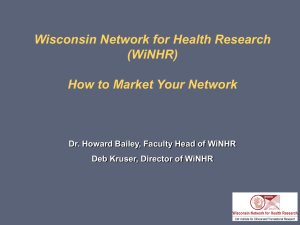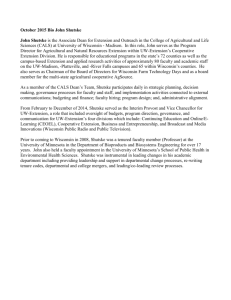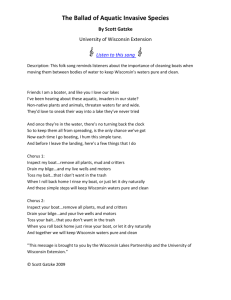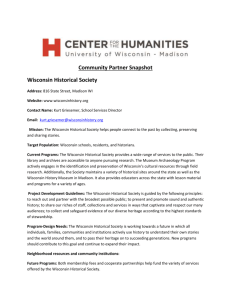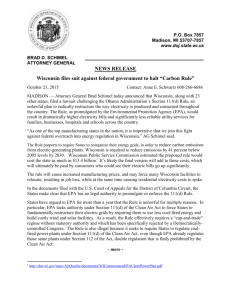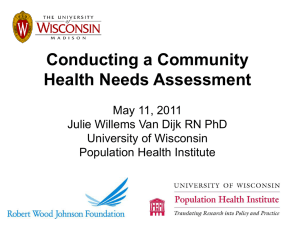Domain 10 Policy Considerations - Institute for Wisconsin`s Health
advertisement
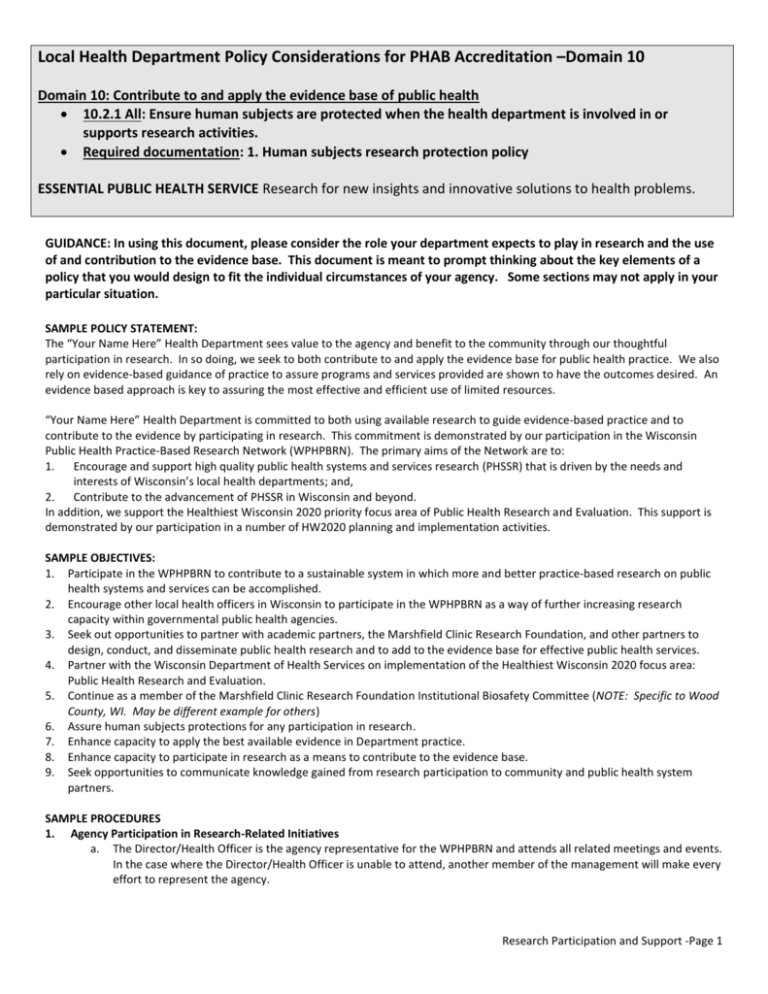
Local Health Department Policy Considerations for PHAB Accreditation –Domain 10 Domain 10: Contribute to and apply the evidence base of public health 10.2.1 All: Ensure human subjects are protected when the health department is involved in or supports research activities. Required documentation: 1. Human subjects research protection policy ESSENTIAL PUBLIC HEALTH SERVICE Research for new insights and innovative solutions to health problems. GUIDANCE: In using this document, please consider the role your department expects to play in research and the use of and contribution to the evidence base. This document is meant to prompt thinking about the key elements of a policy that you would design to fit the individual circumstances of your agency. Some sections may not apply in your particular situation. SAMPLE POLICY STATEMENT: The “Your Name Here” Health Department sees value to the agency and benefit to the community through our thoughtful participation in research. In so doing, we seek to both contribute to and apply the evidence base for public health practice. We also rely on evidence-based guidance of practice to assure programs and services provided are shown to have the outcomes desired. An evidence based approach is key to assuring the most effective and efficient use of limited resources. “Your Name Here” Health Department is committed to both using available research to guide evidence-based practice and to contribute to the evidence by participating in research. This commitment is demonstrated by our participation in the Wisconsin Public Health Practice-Based Research Network (WPHPBRN). The primary aims of the Network are to: 1. Encourage and support high quality public health systems and services research (PHSSR) that is driven by the needs and interests of Wisconsin’s local health departments; and, 2. Contribute to the advancement of PHSSR in Wisconsin and beyond. In addition, we support the Healthiest Wisconsin 2020 priority focus area of Public Health Research and Evaluation. This support is demonstrated by our participation in a number of HW2020 planning and implementation activities. SAMPLE OBJECTIVES: 1. Participate in the WPHPBRN to contribute to a sustainable system in which more and better practice-based research on public health systems and services can be accomplished. 2. Encourage other local health officers in Wisconsin to participate in the WPHPBRN as a way of further increasing research capacity within governmental public health agencies. 3. Seek out opportunities to partner with academic partners, the Marshfield Clinic Research Foundation, and other partners to design, conduct, and disseminate public health research and to add to the evidence base for effective public health services. 4. Partner with the Wisconsin Department of Health Services on implementation of the Healthiest Wisconsin 2020 focus area: Public Health Research and Evaluation. 5. Continue as a member of the Marshfield Clinic Research Foundation Institutional Biosafety Committee (NOTE: Specific to Wood County, WI. May be different example for others) 6. Assure human subjects protections for any participation in research. 7. Enhance capacity to apply the best available evidence in Department practice. 8. Enhance capacity to participate in research as a means to contribute to the evidence base. 9. Seek opportunities to communicate knowledge gained from research participation to community and public health system partners. SAMPLE PROCEDURES 1. Agency Participation in Research-Related Initiatives a. The Director/Health Officer is the agency representative for the WPHPBRN and attends all related meetings and events. In the case where the Director/Health Officer is unable to attend, another member of the management will make every effort to represent the agency. Research Participation and Support -Page 1 b. c. d. e. The Director/Health Officer brings WPHPBRN-related information to peers in the Northern Region WI Association of Local Health Departments and Boards and facilitates related discussions, while also encouraging active participation by other agencies. (Note: Specific to Wood County, WI. May be different for others.) The Director/Health Officer shares related information with the Marshfield Clinic Research Foundation to seek out opportunities to collaborate on public health systems and services research priorities. The Director/Health Officer seeks out opportunities to partner with the Wisconsin Department of Health Services on the Healthiest Wisconsin 2020 research and evaluation priority area. Staff routinely access resources to seek out evidence-based programs and services to address local priorities. This evidence-based material is used to guide agency policy and procedure development and to implement and evaluate programs. Where limited or no research or evidence-based documentation is available, staff advise the Director/Health Officer, who then brings these issues forward to the WPHPBRN, the Marshfield Clinic Research Foundation, academic partners, or others to determine feasibility of contributing to the research base on that issue. 2. Policy, Priority and Role Considerations for Participation in Research a. The Department will consider research participation a) when the Department initiates participation in a research project or b) in response to a request from a researcher to involve the agency in a project b. The Health Officer/Administrative team will assure a consistent internal process to assess the priority, value and feasibility of participation in the particular research project c. The Health Officer/Administrative team, in collaboration with the Principal Investigator, will identify the potential role the agency, or groups of people served by the agency, could play in particular research projects. Policy and priority considerations may include: i. The priority of the research in advancing health promotion, early detection and/or prevention of disease. ii. The degree to which the research project is deemed to aligned with priorities for the Department iii. The degree to which the research project is deemed to have benefit to the population served by the Department or the agency or is deemed to be an important contribution of practice based evidence to the public health field. iv. The Department may participate at different levels in a research project, such as consultation on relevance, project design, logistical considerations, provision of data, participation of staff in surveys, or ranging up to full collaboration as an agency or the involvement of populations served by the agency as study participants. The level of involvement is understood to influence the nature and range of issues to be considered as part of participation. v. Assessment of whether financial or other conflicts of interest exist, and how they might be resolved. vi. Assessment of any effect on the equity of services provided and how such issues will be resolved, or preclude participation. vii. Whether the Department has the capacity in time, staff and other resources to participate in the project, or is able to receive financial or other resources as needed. viii. Whether the Department has the skills or can access any training needed in order to participate in the project, including whether training in human subject protections is needed for any agency personnel. ix. Whether the Department is able to participate in the design of the research project in order to provide feedback on important issues such as linguistic access, cultural or community sensitivity, or other areas of expertise with specific populations. x. How well the Department is able to participate in planning for aspects of the project issues that affect daily operations. xi. The interest and feasibility of sustaining any new intervention or protocol or benefit after the end of the project. xii. Plans for how the Department/community partners/participants will be presented with research findings and/or have a role in interpreting findings. xiii. The interest and feasibility of a Department role in communicating research findings to community and/or public health stakeholders. xiv. Involvement of the Department in developing plans for data management and data use, including use of the data for Department or population health benefit. 3. Assurance of Human Subjects Protections a. Research will adhere to ethical principles guidelines as expressed in The Belmont Report (US DHEW, April 18, 1979) b. The Department will have the following expectations of an academic partner/researcher: Research Participation and Support -Page 2 c. d. e. f. i. Has organizational affiliation with an institution that has the infrastructure to manage and apply human subjects considerations (an IRB) ii. Has primary responsibility for assuring human subjects considerations iii. Plans collaboratively with the Department for meeting human subjects considerations iv. Considers agency input into research project design (practical and logistical considerations, “real world” implications) v. Involves the department in any discussions of providing compensation to participants (distinct from issues involving compensation of the agency for participation) vi. Involves the department in plans for data management and data use, including storage, release of information, use of names or other identifiers, destruction of data at the conclusion of the research, or any use of audio or video materials or transcripts. The Department will specifically ask about and document the process by which the researcher will assure Human Subject Protections through the IRB if their home institution. The Department will not have its own IRB, but will follow the guidance of the IRB of our research partner. We value the purpose of an IRB to approve, monitor, and review research involving human subjects and are committed to protecting the rights and welfare of research subjects. The Department will consider the specific activities of the proposed research project to assure ethical public health practice is maintained during as the project is conducted: i. Participation of agency staff or clients will be voluntary, and the ability to discontinue participation at any time will be assured. ii. Informed consent for participation will be assured. iii. Potential participants will be given information about the research or study. Printed materials, including any consent forms, will be available in the primary language of the participant, and/or arrangements for use of an interpreter will be made by the researcher or department as meets the needs of a given project. iv. Informational materials about the project will include whom to contact with questions. v. Informational materials about the project will include any estimated benefits or costs/negative effects and will be clear about confidentiality, and any use of personal health data. vi. Individual clients or families will not be specifically recruited, but all members of a defined population (people with asthma, uninsured immigrants, etc.) can receive informational materials about the recruitment. vii. When participating in research activities, confidentiality will be assured as required by all applicable laws, regulations, and internal and research partner policies. viii. Efforts will be made to avoid or resolve any real or perceived conflicts of interest with funding sources or others. ix. Corporation Counsel will be consulted as needed. The Department will consider whether its own documentation of decisions related to human subjects considerations is beneficial for any given project. The Department will provide or otherwise assure training in human subjects protections as needed for departmental personnel for whom such training would ordinarily be deemed appropriate for their role in the project. EVALUATION: This policy and procedure will be reviewed annually by the health department management team. The objectives will be reviewed and updated as needed. Examples of meeting each of the objectives will be discussed. RELATED DOCUMENTS and REFERENCES: 1. Centers for Disease Control and Prevention, Guide to Community Preventive Services, www.thecommunityguide.org (November 17, 2011) 2. Wisconsin Areas Health Education Center (AHEC) Program Informed Caring, www.informedcaring.org (November 17, 2011) 3. University of Wisconsin Population Health Institute, What Works: Policies and Programs to Improve Wisconsin’s Health, http://whatworksforhealth.wisc.edu, (November 17, 2011) 4. Wisconsin Department of Health Services Division of Public Health, Wisconsin State Health Plan: Healthiest Wisconsin 2020, http://www.dhs.wisconsin.gov/hw2020/, (November 17, 2011) 5. Institute for Wisconsin’s Health, Wisconsin’s Public Health Quality Initiative, http://instituteforwihealth.org/phpbrn_portal/, (November 17, 2011) 6. Community-Campus Partnerships for Health, Educational Conference Call Series on Institutional Review Boards (IRBs) and Ethical Issues in Research Homepage, http://depts.washington.edu/ccph/irbcalls2.html#1, (November 17, 2011) Research Participation and Support -Page 3 7. 8. 9. http://depts.washington.edu/ccph/pdf_files/FinalResearchEthicsCallSeriesReport.pdf National Commission for the Protection of Human Subjects of Biomedical and Behavioral Research, Belmont Report: Ethical Principles and Guidelines for the Protection of Human Subjects of Research, (US DHEW, April 18, 1979). National Institutes of Health, Guidelines for the Conduct of Research Involving Human Subjects (US DHHS-NIH, 5th Printing, August 2004, 2004,00-4783) Guidelines reviewed and approved. _________________________________ Director of Public Health ___/___/___ _________________________________ ___/___/___ Director of ?? (if another signature applies in particular agency context) ICTR CAP acknowledges the colloborative partners in the creation of these policy considerations: • Andrea Dearlove, MS, Outreach Specialist, ICTR Community Academic Partnerships Program • Betty Kaiser, PhD, RN, Community Research Trainer, WINNERS Project, University of Wisconsin School of Nursing • Susan Kunferman, XX, XX, Director, Wood County Health Department • Muriel Nagle, RN, MSN, Staff Director, ICTR Community Academic Partnerships Program • Susan Zahner, DrPH, MPH, RN, Associate Professor and Co-Director, Wisconsin Public Health Practice Based Research Network, University of Wisconsin School of Nursing Leave a box as a placeholder for WOOD COUNTY PH logo Research Participation and Support -Page 4
